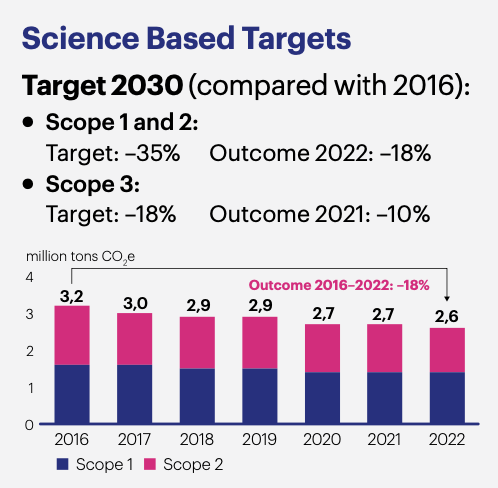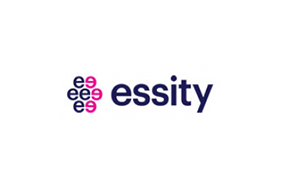Essity 2022 Annual and Sustainability Report: Reduction in Greenhouse Gas Emissions
For the well-being of people and planet
Published 05-25-23
Submitted by Essity

Originally published on Essity.com
Reduction in greenhouse gas emissions
Emissions and pollution have a negative impact on biodiversity. Reducing greenhouse gas emissions and the carbon footprint of our operations has been a major focus for Essity for many years. The company has committed to achieve net zero emissions of greenhouse gases by 2050 and has Science Based Targets for Scope 1, 2 and 3, encompassing both our own operations and our suppliers’ value chain. We have raised our ambitions for existing Science Based Targets in Scope 1 and 2. Essity has a clear strategy and plan for how it will achieve these targets and the most important priorities have been identified. These actions will encompass the entire value chain, from raw materials, production, distribution, and consumer use to the management of used products. Essity has joined the UN Global Compact’s “Business Ambition for 1.5°C”. The climate targets are aligned with the ambitions of the Paris Agreement to reduce global warming. The initiative is supported by the CDP, World Resources Institute (WRI), WWF and UN Global Compact.
The road to net zero emissions
Essity focuses on the following areas to achieve our ambition of net zero emissions.
- Sustainable innovations: For many years, we have worked with life cycle assessments (LCAs) to reduce material use in products and to develop thinner products without affecting functionality or quality. We support sustainable consumption with products such as leakproof apparel, hybrid baby diapers and digital services such as TENA SmartCare. Through sustainable innovation and daily improvements, Essity has reduced the carbon footprint in the company’s different product offerings by up to 43% over a ten-year period in Europe. Essity’s Group target is that at least 50% of the company’s innovations are to yield social and/or environmental improvements. In 2022, the outcome was 68%.
- Climate-smart materials: Essity strives to use more materials with lower greenhouse gas emissions. The largest share of greenhouse gas emissions from purchased raw materials is from fresh fiber and fossil-based plastic used in our products and packaging. We collaborate with our suppliers to develop sustainable products with a focus on alternative, renewable and recycled materials, and encourage them to establish targets and increase the use of renewable energy.
- Fossil-fuel-free tissue production: Our tissue manufacturing is an energy intensive process and one of our most important tasks to achieve net zero emissions by 2050 is therefore to become free from fossil fuels. To achieve this, measures include the increased use of low-carbon hydrogen, biomass, bio-gas, geothermal steam, and electrification of our tissue processes. Essity’s production facilities in Kostheim, Germany, and Lilla Edet, Sweden, are examples of how we strive to replace fossil fuels with renewable resources.
- Resource efficiency: Essity has extensive experience of working with resource efficiency, including in our M-Save and E-Save programs that focus on material and energy efficiency in our tissue manufacturing. The reduction in CO2 emissions per ton produced between 2005 and 2022 was 23%. During the 2022 energy crisis, we took additional measures such as investing in our capability to utilize a wider variety of fuels, enabling us to react quickly to peak market prices, and conducted global training courses on the most effective ways to reduce energy use.
- Breakthrough technology: In 2021, Essity began tissue manufacturing using pulp from wheat straw. Essity’s facility in Mannheim, Germany, is the world’s first facility in the tissue industry to use these agricultural by-products for large-scale production. We are also exploring future tissue technology to reduce resources used in our production.
- Zero production waste: Essity acts to make production waste a valuable resource and reduce our greenhouse gas emissions at the same time. The target for 2030 is that all production waste will be subject to material and energy recovery. In 2022, the total amount of production waste decreased, and 62% was recycled.
- Clean transport: We continue to reduce emissions in our transportation network by maximizing the load-fill, optimizing routes, and gradually switching to lower emission fuels. We are integrating sustainability into Essity’s global transportation model by adding emission factors as a way toward optimizing our load planning.
- Less waste after use: To reduce waste from our products and packaging, Essity is developing innovative solutions to reduce consumption as well as new business models for recycling after use. To address recycling, we have improved the recyclability of our paper and plastic packaging. We offer compostable tissue products to reduce waste and the Tork PaperCircle recycling service has been expanded to ten markets.

To ensure that we meet our targets, Essity has appointed a steering committee led by members of the Executive Management Team. Additionally, we are identifying the impact of climate change on Essity’s business using the TCFD framework.
Read more about Essity’s strategic priorities, earnings and leading sustainability work in the Annual and Sustainability Report 2022, which can be downloaded at www.essity.com.
To access the digital short version, please click here.

Essity
Essity
Essity is a leading global hygiene and health company that develops, produces and sells Personal Care (Baby Care, Feminine Care, Incontinence Products and Medical Solutions), Consumer Tissue and Professional Hygiene products and solutions.
Our vision is; Dedicated to improving well-being through leading hygiene and health solutions. The name Essity stems from the words essentials and necessities. Sales are conducted in approximately 150 countries under many strong brands, including the leading global brands TENA and Tork, and other brands, such as Leukoplast, Libero, Libresse, Lotus, Nosotras, Saba, Tempo, Vinda and Zewa. Essity has about 48,000 employees and net sales in 2017 amounted to approximately 12.8 bn USD (SEK 109bn, EUR 11.3bn). The business operations are based on a sustainable business model with focus on value creation for people and nature.
The company has its headquarters in Stockholm, Sweden, and is listed on Nasdaq Stockholm. Essity used to be part of the SCA Group.
About Tork
Tork is a brand of Essity. Essity is a leading global hygiene and health company that develops personal care, professional hygiene and consumer tissue products and solutions. Essity offers Tork paper towels, toilet paper, skin care products, facial tissue, wipers, wet wipes, napkins and other hygiene products for washrooms, wash stations, healthcare areas, food and beverage handling, food preparation, manufacturing and maintenance. For more information, visit http://www.torkusa.com/
More from Essity

